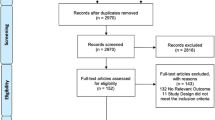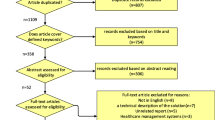Abstract
Cognitive complaints indicate risk for dementia, but few studies have examined the perspective of cognitive complaints in Latinx with type 2 diabetes (T2DM). This study explored the meaning of cognitive health from the perspective of Latinx adults with T2DM to assist in detecting problems with diabetes self-management. This was an exploratory qualitative descriptive study using narrative interviews (n = 30) and content analysis. Participants’ mean age was 66 years; mean time with diabetes, 8.7 years; mean A1C, 9.7%. Participants emphasized health as the absence of disease, memory issues as a cognitive compliant, use of cognitive strategies, and the negative effect of cognitive problems on self-management. An additional finding was the impact of ethnic/racial discrimination on health. This study provides insights into cognitive health for Latinxs as well as the negative impact of racism experienced in the US healthcare system and shows that cognitive health assessment and education can positively impact diabetes self-management.
Similar content being viewed by others
References
Hill NL, Jaqueline M, Whitaker EB, et al. Sources of response bias in cognitive self-report items: “which memory are you talking about?”. Gerontologist. 2019;59:912–24.
Illman NA, Moulin CJ, Kemp S. Assessment of everyday memory functioning in temporal lobe epilepsy and healthy adults using the multifactorial memory questionnaire (MMQ). Epilepsy Res. 2015;113:86–9. https://doi.org/10.1016/j.eplepsyres.2015.03.011.
Bancks MP, Alonso A, Gottesman RF, Mosley TH, Selvin E, Pankow JS. Brain function and structure risk for incident diabetes: the atherosclerosis risk in Communities Study. Alzheimers Dement. 2017;13(12):1345–54. https://doi.org/10.1016/j.jalz.2017.04.006.
Noble JM, Manly JJ, Schupf N, et al. Type 2 diabetes and ethnic disparities in cognitive impairment. Ethn Dis. 2012;22:38–44.
Santos T, Lovell J, Shiell K, Johnson M, Ibrahim JE. The impact of cognitive impairment in dementia on self-care domains in diabetes: a systematic search and narrative review. Diabetes Metab Res Rev. 2018;34(6):e3013. https://doi.org/10.1002/dmrr.3013.
Elfassy T, Aiello AE, Schneiderman N, et al. Relation of diabetes to cognitive function in Hispanics/Latinos of diverse backgrounds in the United States. J Aging Health. 2019;31(7):1155–71. https://doi.org/10.1177/0898264318759379.
Arfanakis K, Wilson RS, Barth CM, et al. Cognitive activity, cognitive function, and brain diffusion characteristics in old age. Brain Imaging Behav. 2016;10(2):455–63. https://doi.org/10.1007/s11682-015-9405-5.
Hughes TF, Sun Z, Chang CH, Ganguli M. Change in engagement in cognitive activity and risk for mild cognitive impairment in a cohort of older adults: the Monongahela-Youghiogheny Healthy Aging Team (MYHAT) study. Alzheimer Dis Assoc Disord. 2018;32(2):137–44. https://doi.org/10.1097/WAD.0000000000000214.
Vance DE, Crowe M. A proposed model of neuroplasticity and cognitive reserve in older adults. Act Adapt Aging. 2006;30(3):61–79. https://doi.org/10.1300/J016v30n03_04.
Vance D, Fazeli P, Shacka J, et al. Testing a computerized cognitive training protocol in adults aging with HIV-associated neurocognitive disorders: randomized controlled trial rationale and protocol. JMIR Res Protoc. 2017;6:e68.
Cody SL, Vance DE. The neurobiology of HIV and its impact on cognitive reserve: a review of interventions for an aging population. Neurobiol Dis. 2016;92:144–56.
Herrera AP, Mendez-Luck CA, Crist JD, et al. Psychosocial and cognitive health differences by caregiver status among older Mexican Americans. Community Ment Health J. 2013;49(1):61–72. https://doi.org/10.1007/s10597-012-9494-1.
Marquine MJ, Segawa E, Wilson RS, Bennett DA, Barnes LL. Association between cognitive activity and cognitive function in older Hispanics. J Int Neuropsychol Soc. 2012;18(6):1041–51. https://doi.org/10.1017/S135561771200080X.
Hilton JM, Gonzalez CA, Saleh M, Maitoza R, Anngela-Cole L. Perceptions of successful aging among older Latinos, in cross-cultural context. J Cross Cult Gerontol. 2012;27(3):183–99. https://doi.org/10.1007/s10823-012-9171-4.
Iwamasa GY, Iwasaki M. A new multidimensional model of successful aging: perceptions of Japanese American older adults. J Cross Cult Gerontol. 2011;26(3):261–78. https://doi.org/10.1007/s10823-011-9147-9.
Ng YH, Al Mawed S, Pankratz VS, et al. Cognitive assessment in a predominantly Hispanic and native American population in New Mexico and its association with kidney transplant wait-listing. Clin Transplant. 2019. https://doi.org/10.1111/ctr.13674.
Schinka JA, Raj A, Loewenstein DA, Small BJ, Duara R, Potter H. Cross-validation of the Florida Cognitive Activities Scale (FCAS) in an Alzheimer’s disease research center sample. J Geriatr Psychiatry Neurol. 2010;23(1):9–14. https://doi.org/10.1177/0891988709342724.
Cuevas H, Stuifbergan A. Perceived cognitive deficits are associated with diabetes self-management in a multiethnic sample. J Diabetes Metab Disord. 2017;16:7. https://doi.org/10.1186/s40200-017-0289-3.
Vasquez PM, Tarraf W, Doza A, et al. The cross-sectional association of cognitive stimulation factors and cognitive function among Latino adults in Hispanic Community Health Study/Study of Latinos (HCHS/SOL). Alzheimers Dement. 2019;5:533–41.
Tong A, Sainsbury P, Craig J. Consolidated criteria for reporting qualitative research (COREQ): a 32-item checklist for interviews and focus groups. Int J Qual Health Care. 2007;19:349–57.
Adu MD, Malabu UH, Malau-Aduli AEO, Malau-Aduli BS. Enablers and barriers to effective diabetes self-management: a multi-national investigation. PLoS ONE. 2019;5:e0217771.
Paterson BL, Sloan J. A phenomenological study of the decision making experience of individuals with long-standing diabetes. Can J Diabetes. 1994;18:10–9.
Centers for Disease Control and Prevention. National diabetes statistics report—2017. Atlanta: Centers for Disease Control and Prevention, US Dept of Health and Human Services; 2017.
Vance DE, Gakumo CA, Childs GD, Enah C, Fazeli PL. Perceptions of brain health and cognition in older African Americans and Caucasians with HIV: a focus group study. J Assoc Nurses AIDS Care. 2017;28(6):862–76. https://doi.org/10.1016/j.jana.2017.07.006.
Vance DE, Fazeli PL, Azuero A, Wadley VG, Jensen M, Raper JL. Can computerized cognitive training reverse the diagnosis of HIV-associated neurocognitive disorder? A research protocol. Res Nurs Health. 2018;41(1):11–8. https://doi.org/10.1002/nur.21841.
Miles MB, Huberman AM, Saldaña J. Qualitative data analysis: a methods sourcebook. 4th ed. Thousand Oaks, CA: SAGE Publications; 2020.
McEwan MM, Pasvogel AP, Murdaugh C. Effects of a family-based diabetes intervention on family social capital outcomes for Mexican American adults. Diabetes Educ. 2019;45:272–86.
Anderson LA, Day KL, Beard RL, Reed PS, Wu B. The public’s perceptions about cognitive health and Alzheimer’s disease among the U.S. population: a national review. Gerontologist. 2009;49(suppl 1):S3–S11. https://doi.org/10.1093/geront/gnp088.
Rozanova J, Noulas P, Southwick SM, Pietrzak RH. Perceptions of determinants of successful aging among older U.S. veterans: results from the National Health and Resilience in Veterans Study. Am J Geratr Psychiatry. 2015;23:744–53.
Friedman DB, Becofsky K, Anderson LA, et al. Public perceptions about risk and protective factors for cognitive health and impairment: a review of the literature. Int Psychogeriatr. 2015;27(8):1263–75. https://doi.org/10.1017/S1041610214002877.
Pew Research Center. (2019) Social Media Fact Sheet. https://www.pewinternet.org/fact-sheet/social-media. Accessed 12 June 2019.
Yu F, Ryan LH, Schaie KW, Willis SL, Kolanowksi A. Factors associated with cognition in adults: the Seattle Longitudinal Study. Res Nurs Health. 2010;32:612–25.
Mungas D, Early DR, Maria-Glymour M, Al Hazzouri AZ, Haan MN. Education, bilingualism, and cognitive trajectories: Sacramento Area Latino Aging Study (SALSA). Neuropsychology. 2018;32:77–88.
Wilcox S, Sharkey JR, Mathews AE, et al. Perceptions and beliefs about the role of physical activity and nutrition on brain health in older adults. Gerontologist. 2009;49(suppl 1):S61–S71.
Stuifbergen A, Becker H, Morgan S, Morrison J, Perez F. Home-based computer-assisted cognitive training: feasibility and perceptions of people with multiple sclerosis. Int J MS Care. 2011;13(4):189–98.
Pressler SJ, Titler M, Koelling TM, et al. Nurse-enhanced computerized cognitive training increases serum brain-derived neurotropic factor levels and improves working memory in heart failure. J Card Fail. 2015;21(8):630–41.
Von Ah D, Carpenter JS, Saykin A, et al. Advanced cognitive training for breast cancer survivors: a randomized controlled trial. Breast Cancer Res Treat. 2012;135(3):799–809. https://doi.org/10.1007/s10549-012-2210-6.
Becker H, Henneghan AM, Volker DL, Mikan SQ. A pilot study of a cognitive-behavioral intervention for breast cancer survivors. Oncol Nurs Forum. 2017;44(2):255–64. https://doi.org/10.1188/17.ONF.255-264.
Park JH, Jung YS, Kim KS, Bae SH. Effects of compensatory cognitive training intervention for breast cancer patients undergoing chemotherapy: a pilot study. Support Care Cancer. 2017;25(6):1887–966. https://doi.org/10.1007/s00520-017-3589-8.
Sprague BN, Freed SA, Webb CE, Phillips CB, Hyun J, Ross LA. The impact of behavioral interventions on cognitive function in healthy older adults: a systematic review. Aging Res Rev. 2019;52:32–52.
Lustig C, Shah P, Seidler R, Reuter-Lorenz PA. Aging, training, and the brain: a review and future directions. Neuropsychol Rev. 2009;19:504–22.
Cuevas HE, Stuifbergen AK, Brown SA, Ward C. A nurse-led cognitive training intervention for individuals with type 2 diabetes. Res Gerontol Nurs. 2019;12(4):203–12. https://doi.org/10.3928/19404921-20190612-01.
Hopkins R, Shaver K, Weinstock RS. Management of adults with diabetes and cognitive problems. Diabetes Spect. 2016;29(4):224–37. https://doi.org/10.2337/ds16-0035.
Gatlin PK, Insel KC. Severity of type 2 diabetes, cognitive function, and self-care. Biol Res Nurs. 2015;17(5):540–8. https://doi.org/10.1177/1099800414557565.
Lin JS, O’Connor E, Rossom RC, Perdue LA, Eckstrom E. Screening for cognitive impairment in older adults: a systematic review for the U.S. preventive services task force. Ann Intern Med. 2013;159(9):601–12. https://doi.org/10.7326/0003-4819-159-9-201311050-00730.
Cuevas HE, Stuifbergen AK, Brown SA, Rock JL. Thinking about cognitive function: perceptions of cognitive changes in people with type 2 diabetes. Diabetes Educ. 2017;43(5):486–94. https://doi.org/10.1177/0145721717729806.
Sharkey JR, Sharf BF, St John JA. “Una persona derechita (staying in the right mind)”: perceptions of Spanish-speaking Mexican American older adults in south Texas colonias. Gerontologist. 2009;49(suppl 1):S79–S85. https://doi.org/10.1093/geront/gnp086.
Campesino M, Saenz DS, Choi M, Krouse RS. Perceived discrimination and ethnic identity among breast cancer survivors. Oncol Nurs Forum. 2012;39(2):E91–E100. https://doi.org/10.1188/12.ONF.E91-E100.
Hernández LH, Upton SDLS. Critical health communication methods at the U.S.-Mexico border: violence against migrant women and the role of health activism. Front Commun. 2019;4:34. https://doi.org/10.3389/fcomm.2019.00034.
Cueto M, Palmer S. Medicine and public health in Latin America: A History. New York: Cambridge University Press; 2014.
LeBrón AMW, Spencer M, Kieffer E, Sinco B, Palmisano G. Racial/ethnic discrimination and diabetes-related outcomes among Latinos with type 2 diabetes. J Immigr Minor Health. 2019;21(1):105–14. https://doi.org/10.1007/s10903-018-0710-0.
Wagner J, Armeli S, Tennen H, Bermudez-Millan A, Wolpert H, Pérez-Escamilla R. Mean levels and variability in affect, diabetes self-care behaviors, and continuously monitored glucose: a daily study of Latinos with type 2 diabetes. Psychosom Med. 2017;79(7):798–805. https://doi.org/10.1097/PSY.0000000000000477.
Assari S, Lee DB, Nicklett EJ, et al. Racial discrimination in health care is associated with worse glycemic control among black men but not black women with type 2 diabetes. Front Public Health. 2017;5:235. https://doi.org/10.3389/fpubh.2017.00235.
Barnes LL, Lewis TT, Begeny CT, Yu L, Bennett DA, Wilson RS. Perceived discrimination and cognition in older African Americans. J Int Neuropsychol Soc. 2012;18(5):856–65. https://doi.org/10.1017/S1355617712000628.
Author information
Authors and Affiliations
Corresponding author
Additional information
Publisher's Note
Springer Nature remains neutral with regard to jurisdictional claims in published maps and institutional affiliations.
Rights and permissions
About this article
Cite this article
Cuevas, H., Zuñiga, J. Latinx with Type 2 Diabetes: Perceptions of Cognitive Health. J Immigrant Minority Health 23, 337–343 (2021). https://doi.org/10.1007/s10903-020-00995-7
Published:
Issue Date:
DOI: https://doi.org/10.1007/s10903-020-00995-7




